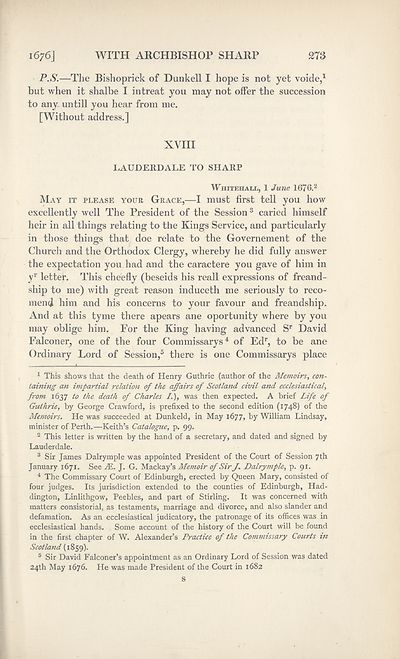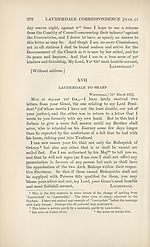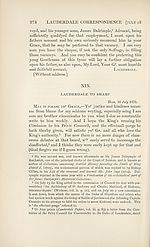Series 1 > Miscellany of the Scottish History Society (First volume)
(368) Page 273
Download files
Complete book:
Individual page:
Thumbnail gallery: Grid view | List view

1676] WITH ARCHBISHOP SHARP 273
P.S.—The Bishoprick of Dunkell I hope is not yet voide,1
but when it shalbe I intreat you may not offer the succession
to any. untill you hear from me.
[Without address.]
XVIII
LAUDERDALE TO SHARP
Whitehall, 1 June 1676.2
May it please your Grace,—I must first tell you how
excellently well The President of the Session3 caried himself
heir in all things relating to the Kings Service, and particularly
in those things that doe relate to the Governement of the
Church and the Orthodox Clergy, whereby he did fully answer
the expectation you had and the caractere you gave of him in
yr letter. This cheefly (beseids his reall expressions of freand-
ship to me) with great reason induceth me seriously to reco¬
mend him and his concerns to your favour and freandship.
And at this tyme there apears ane oportunity where by you
may oblige him. For the King having advanced Sr David
Falconer, one of the four Commissarys4 of Edr, to be ane
Ordinary Lord of Session,5 there is one Commissarys place
1 This shows that the death of Henry Guthrie (author of the Memoirs, con¬
taining an impartial relation of the affairs of Scotland civil and ecclesiastical,
from 1637 to the death of Charles /.), was then expected. A brief Life of
Guthrie, by George Crawford, is prefixed to the second edition (1748) of the
Memoirs. He was succeeded at Dunkeld, in May 1677, by William Lindsay,
minister of Perth.—Keith’s Catalogue, p. 99.
2 This letter is written by the hand of a secretary, and dated and signed by
Lauderdale.
3 Sir James Dalrymple was appointed President of the Court of Session 7th
January 1671. See JE. J. G. Mackay’s Memoir of Sir J. Dalrymple, p. 91.
4 The Commissary Court of Edinburgh, erected by Queen Mary, consisted of
four judges. Its jurisdiction extended to the counties of Edinburgh, Had¬
dington, Linlithgow, Peebles, and part of Stirling. It was concerned with
matters consistorial, as testaments, marriage and divorce, and also slander and
defamation. As an ecclesiastical judicatory, the patronage of its offices was in
ecclesiastical hands. Some account of the history of the Court will be found
in the first chapter of W. Alexander’s Practice of the Commissary Courts in
Scotland (1859).
5 Sir David Falconer’s appointment as an Ordinary Lord of Session was dated
24th May 1676. He was made President of the Court in 1682
S
P.S.—The Bishoprick of Dunkell I hope is not yet voide,1
but when it shalbe I intreat you may not offer the succession
to any. untill you hear from me.
[Without address.]
XVIII
LAUDERDALE TO SHARP
Whitehall, 1 June 1676.2
May it please your Grace,—I must first tell you how
excellently well The President of the Session3 caried himself
heir in all things relating to the Kings Service, and particularly
in those things that doe relate to the Governement of the
Church and the Orthodox Clergy, whereby he did fully answer
the expectation you had and the caractere you gave of him in
yr letter. This cheefly (beseids his reall expressions of freand-
ship to me) with great reason induceth me seriously to reco¬
mend him and his concerns to your favour and freandship.
And at this tyme there apears ane oportunity where by you
may oblige him. For the King having advanced Sr David
Falconer, one of the four Commissarys4 of Edr, to be ane
Ordinary Lord of Session,5 there is one Commissarys place
1 This shows that the death of Henry Guthrie (author of the Memoirs, con¬
taining an impartial relation of the affairs of Scotland civil and ecclesiastical,
from 1637 to the death of Charles /.), was then expected. A brief Life of
Guthrie, by George Crawford, is prefixed to the second edition (1748) of the
Memoirs. He was succeeded at Dunkeld, in May 1677, by William Lindsay,
minister of Perth.—Keith’s Catalogue, p. 99.
2 This letter is written by the hand of a secretary, and dated and signed by
Lauderdale.
3 Sir James Dalrymple was appointed President of the Court of Session 7th
January 1671. See JE. J. G. Mackay’s Memoir of Sir J. Dalrymple, p. 91.
4 The Commissary Court of Edinburgh, erected by Queen Mary, consisted of
four judges. Its jurisdiction extended to the counties of Edinburgh, Had¬
dington, Linlithgow, Peebles, and part of Stirling. It was concerned with
matters consistorial, as testaments, marriage and divorce, and also slander and
defamation. As an ecclesiastical judicatory, the patronage of its offices was in
ecclesiastical hands. Some account of the history of the Court will be found
in the first chapter of W. Alexander’s Practice of the Commissary Courts in
Scotland (1859).
5 Sir David Falconer’s appointment as an Ordinary Lord of Session was dated
24th May 1676. He was made President of the Court in 1682
S
Set display mode to:
![]() Universal Viewer |
Universal Viewer | ![]() Mirador |
Large image | Transcription
Mirador |
Large image | Transcription
Images and transcriptions on this page, including medium image downloads, may be used under the Creative Commons Attribution 4.0 International Licence unless otherwise stated. ![]()
| Scottish History Society volumes > Series 1 > Miscellany of the Scottish History Society (First volume) > (368) Page 273 |
|---|
| Permanent URL | https://digital.nls.uk/127085277 |
|---|
| Attribution and copyright: |
|
|---|
| Description | Over 180 volumes, published by the Scottish History Society, containing original sources on Scotland's history and people. With a wide range of subjects, the books collectively cover all periods from the 12th to 20th centuries, and reflect changing trends in Scottish history. Sources are accompanied by scholarly interpretation, references and bibliographies. Volumes are usually published annually, and more digitised volumes will be added as they become available. |
|---|


